

The following stories spotlight the service of Charlies “Charlie” Joyce Chibitty, WWII Comanche Code Talker, who was the brother of my dear friend, Woggie Watchetaker. On this 4th of July, I would like to pay tribute to Mr. Chibitty and the other many great warriors who served as code talkers and were a huge factor in achieving victory in the WWII conflict. I had the great honor and have fond memories of meeting Mr. Chibitty on several occasions.
This is ‘Charlie’s” great story. 
CHARLES J. CHIBITTY served with the US Army from January 1, 1941 to July 3, 1945 earning the rank of T/5. He was a member of the Comanche Code Talkers. T/5 Chibitty was from the Mount Scott-Porter Hill area and a Golden Gloves boxer and fancy war dancer. He was the last surviving Code Talker when he passed away on July 20, 2005 at the age of eighty-three.
Charles Chibitty, the last surviving World War II Comanche code talker, donned his feathered Indian chief’s headdress and offered a prayer in the Pentagon Chapel for those killed in the terrorist attack on the building. Photo by Rudi Williams.
Arthur L. Money presents Charles Chibitty with a cased American flag that was flown over the capitol during ceremonies in the Pentagon’s Hall of Heroes. The 78- year-old Chibitty is the last surviving World War II Army Comanche “code talker.” Money is the assistant secretary of defense for command, control, communications, and intelligence. Photo by Staff Sgt. Robert Broils, USA.
When Charles Chibitty, the last surviving World War II Comanche code talker, visited Secretary of Defense Donald Rumsfeld at the Pentagon in 2002, the secretary presented him a memento of a small engraved box. Photo by Rudi Williams
![]()
DoD Honors Last Comanche World War II “Code Talker”
By Rudi Williams American Forces Press Service
WASHINGTON, Dec. 3, 1999 – Charles Chibitty, 78, was honored here Nov. 30 as the last surviving World War II Army Comanche “code talker” during an emotional ceremony in the Pentagon’s Hall of Heroes.The ceremony was punctuated by thundering drumbeats echoing through the Pentagon corridor and “vocables” of joy and sadness. “Vocables” are sounds replacing words so singers of various Native American tribes can sing together.
Chibitty received the Knowlton Award, created by the Military Intelligence Corps Association in 1995 to recognize significant contributions to military intelligence efforts. The award is named in honor of Revolutionary War Army Lt. Col. Thomas Knowlton.
Arthur L. Money, assistant secretary of defense for command, control, communications, and intelligence, presented Chibitty the award in recognition of the role he and 16 other Comanche Indians played in cloaking military messages on the battlefields of Europe. The Comanches frustrated enemy code breakers by translating Army messages into their native language. The enemy never broke the code.
The code talkers are credited with saving countless American and allied lives, said Money, who also presented Chibitty an American flag that was flown over the capitol and a framed letter from Johnny Waugua, chairman of the Comanche Tribe of Oklahoma.
“Volunteers like Mr. Chibitty were key to the U.S. and allied forces’success from Normandy to Berlin,” Money said. “History has proven that our ‘code talkers’ thoroughly confounded our enemy’s intelligence collection efforts, which on several occasions gave us the tactical advantage to ensure success while minimizing the risk to our troops.”
“It’s incredibly ironic that my agency, the Bureau of Indian Affairs, dedicated itself for the first half of this century to destroying the native languages that proved to be so useful to our armed forces during World War II,” said Kevin Gover, the Department of Interior’s assistant secretary of Indian affairs. “It’s a great irony that in just two or three generations of being in conflict with the United States, our warriors would go forward and play such a crucial role in the victory over this country’s enemies.” Gover assisted with the presentations.
Chibitty said the French government recognized Comanche code talkers in 1989 by presenting them that country’s second highest honor — naming each a Knight of the National Order of Merit. But, he said, being honored at the Pentagon was special because “you’re home folks.”
“I always wonder why it took so long to recognize us for what we did,” Chibitty said, holding back tears as he spoke of his deceased Comanche comrades. “They’re not here to enjoy what I’m getting after all these years. Yes, it’s been a long, long time.”
Using the code the Comanches created in 1941 during training at Fort Benning, Ga., Chibitty sent the first message on D-Day which, in English, translated to “Five miles to the right of the designated area and five miles inland the fighting is fierce and we need help.”
“We compiled a 100-word vocabulary of military terms during training,” said Chibitty, who joined the Army in January 1941 along with 20 other Comanches. “The Navajo did the same thing. The Navajos became code talkers about a year after the Comanches, but there were over a hundred of them because they had so much territory (in the Pacific Theater) to cover.”
Choctaw Indians were used as code talkers during World War I.
Since there was no Comanche word for “tank,” the code talkers used their word for “turtle.” “Machine gun” became “sewing machine,” Chibitty noted, “because of the noise the sewing machine made when my mother was sewing.” “Bomber” became “pregnant airplane.” “Hitler,” he said with a grin, was “posah-tai-vo,” or “crazy white man.”
Chibitty said two Comanches were assigned to each of the 4th Infantry Division’s three regiments. They sent coded messages from the front line to division headquarters, where other Comanches decoded the messages. He said some of the code talkers were wounded, but all survived the war.
“The only thing I regret is my fellow code talkers are not here,” Chibitty said. “But I have a feeling those boys are here somewhere listening and looking down.”
When his last fellow code talker died in September 1998, Chibitty said, “All those other boys up there were welcoming him home. They were hugging and kissing him and, while they were doing that, they said, ‘Wait a minute, we’ve still got one more down there. When Charles gets up here, we’re going to welcome him just like we welcoming you.””

“You had this way of speaking that nobody could translate. The way you used your language was of such great advantage to your country,” Les Brownlee, the undersecretary of the Army, told Charles Chibitty, the last surviving World War II Comanche code talker during a visit to his Pentagon office. Photo by Rudi Williams.
![]()
Last WWII Comache Code Talker Visist Pentagon, Arlington Cemetery
By Rudi Williams American Forces Press Service
WASHINGTON, Nov. 8, 2002 – After meeting with the defense secretary and other top Pentagon officials on Nov. 5, Charles Chibitty, the last surviving World War II Comanche code talker, donned his feathered Indian chief’s headdress and offered a prayer in the Pentagon Chapel for those killed in the terrorist attack on the building.
The aging code talker then placed a wreath and offered an Indian prayer at the Tomb of the Unknowns at Arlington (Va.) National Cemetery. This marks the third time the 81-year old war veteran was honored at the Pentagon for his service to the nation. His visits in 1992 and 1999 were also in November during National American Indian Heritage Month.
While meeting at the Pentagon with Secretary of Defense Donald Rumsfeld, Undersecretary of the Army Les Brownlee and Raymond F. DuBois Jr., deputy undersecretary of defense for installations and environment, Chibitty recounted his wartime experiences when his unit landed on the Normandy shores on “the first or second day after D-Day.” After his unit hit Utah Beach, his first radio message was sent to another codetalker on an incoming boat. Translated into English, it said: “Five miles to the right of the designated area and five miles inland, the fighting is fierce and we need help.”
“We were trying to let them know where we were so they wouldn’t lob no shells on us,” he explained with a chuckle. “I was with the 22nd Infantry Regiment of the 4th Infantry Division. We talked Indian and sent messages when need be. It was quicker to use telephones and radios to send messages because Morse code had to be decoded and the Germans could decode them. We used telephones and radios to talk Indian then wrote it in English and gave it to the commanding officer.”
Chibitty said two Comanches were assigned to each of the 4th Infantry Division’s three regiments. They sent coded messages from the front line to division headquarters, where other Comanches decoded the messages.
He said 20 Comanches signed up to be code talkers, but only 17 went to training at Fort Benning, Ga., and only 14 hit Utah Beach at Normandy. “None of us was killed, but two were wounded pretty badly; one was my cousin,” Chibitty noted.
Brownlee asked him if he was hit and Chibitty said, “Heck, no. I was like a prairie dog. As soon as I heard a whistle, I’d dive in that hole. I was little then. I weighed 126 pounds and it didn’t take long for me to dig my hole. My buddy weighed 240 pounds and some of them were more than six feet tall and they had to dig a long trench.”
Speaking in the Comanche language, Chibitty gave Brownlee another example of a message code talkers sent to other units, then translated it for him: “A turtle is coming down the hedgerow. Get that stovepipe and shoot him.”
“A turtle was a tank and a stovepipe was a bazooka,” he explained. “We couldn’t say tank or bazooka in Comanche, so we had to substitute something else. A turtle has a hard shell, so it was a tank.”
Since there was no Comanche word for machine gun it became “sewing machine,” Chibitty noted, “because of the noise the sewing machine made when my mother was sewing.” Hitler, he said, was “posah-tai-vo,” or “crazy white man.”
There are no other words in his language to describe a bomber aircraft, so they said, “Daddy and I went fishing and we cut that catfish open and he’s full of eggs. Well, that bomber was up there just like this catfish, it’s full of eggs, too, so we called it a pregnant airplane.”
“We got so we could send any message, word for word, letter for letter,” Chibitty said. “The Navajos did the same thing in the Pacific during World War II and the Choctaw used their language during World War I. There were other code talkers from other tribes, but if they didn’t train like the Comanche and Navajos, how could they send a message like we did? If they made a slight mistake, instead of saving lives, it could have cost a lot of lives.”
In 1989, the French government honored the Comanche code talkers, including Chibitty , by presenting them the “Chevalier of the National Order of Merit.” Chibitty has also received a special proclamation from the governor of Oklahoma. In 2001, Congress passed legislation authorizing the presentation of gold medals to Native Americans who served as code talkers during foreign conflicts.
“I felt I was doing something that the military wanted us to do and we did to the best of our ability, not only to save lives, but to confuse the enemy by talking in the Comanche language,” he said. “We felt we were doing something that could help win the war.”
Brownlee asked him if the Comanche language is written and Chibitty said, “There’s a book, but you’ve got to be awfully damn smart to read it. It’s not like alphabets, you have to learn the phonetics to pronounce the words.” The aging code talker then sang Silent Night in the Comanche language.
Chibitty said when he attended Indian school in the 1920s, teachers became angry with him because he was speaking the Comanche language. “When we got caught talking Indian, we got punished,” he noted. “I told my cousin that they’re trying to make little white boys out of us,” he said.
After joining the Army years later, he told his cousin, “They tried to make us quit talking Indian in school, now they want us to talk Indian.”
The retired glazier visits schools to tell the youngsters about what code talkers did and how they did it. He said officials at Comanche headquarters near Lawton, Okla., are trying to preserve the language by teaching it to children.
“The service you and your buddies provided turned out to be invaluable,” Brownlee told the aging veteran. “You had this way of speaking that nobody could translate. The way you used your language was of such great advantage to your country.”
Before returning home to Tulsa, Okla., Chibitty spent some time with researchers at the U.S. Army Center for Military History for oral history sessions. The Army wants to preserve the history of the Comanche code talkers and Chibitty is the last one to tell the story from first-hand experience.
![]()
World War II Comanche Code Talker Laid to Rest – July 29, 2005
By Rudi Williams American Forces Press Service
WASHINGTON, July 29, 2005 – When Charles “Charlie” J. Chibitty, the last World War II Comanche code talker, was buried July 26, a friend wrote in the eulogy, “Charlie’s life has no foreshadowing or ending. As long as wind blows, his life and legacy will continue to twist and turn along courses only wild horses know.”
Charles Chibitty, the last surviving World War II Comanche code talker, told Pentagon officials that teachers at the Indian school near Lawton, Okla., became angry with him for speaking the Comanche language in the early 1920s, then the Army wanted Comanches to use their language as a code during World War II. Chibitty died July 20 in Tulsa, Okla. He was 83. He was invited to the Pentagon three times — in 1992, 1999 and 2002 — in honor of his service to the nation as a World War II code talker. He, along with 16 other Comanche Indians, was part of an Army company of code talkers who befuddled the Germans during the invasion of the beaches of Normandy, France.
During his 2002 Pentagon visit, Chibitty said his unit hit Utah Beach in Normandy “the first or second day after D-Day.” His first radio message was sent to another code talker on an incoming boat. Translated into English, it said: “Five miles to the right of the designated area and five miles inland, the fighting is fierce and we need help.”
“We were trying to let them know where we were so they wouldn’t lob no shells on us,” he explained with a chuckle. “I was with the 22nd Infantry Regiment of the 4th Infantry Division. We talked Indian and sent messages when need be. It was quicker to use telephones and radios to send messages, because Morse code had to be decoded and the Germans could decode them. We used telephones and radios to talk Indian, then wrote it in English and gave it to the commanding officer.”
The Comanche Indians frustrated enemy code breakers by translating Army messages into their native language. The enemy never broke the code.
Chibitty enlisted in the Army in January 1941. He earned the World War II Victory Medal, European Theater of Operations Victory Medal with five bronze stars, Europe-African Middle East Campaign Medal and the Good Conduct Medal. In 1989, the French government honored the Comanche code talkers by presenting them the Chavalier of the National Order of Merit.
He was presented the Knowlton Award, created by the Military Intelligence Association, in 1995 to recognize significant contributions to military efforts. In April 2003, Chibitty attended the dedication ceremony for a monument to Choctaw and Comanche code talkers of World War I and World War II at Camp Beuregard in Pineville, La., where he trained during World War II. When he visited the Pentagon in 1992, then-Defense Secretary Dick Cheney presented him a certificate of appreciation for his service to the country. Chibitty also received a special proclamation from the governor of Oklahoma, who honored him for his contributions to that state and the nation.
When Chibitty visited the Pentagon in November 2002, he donned his feathered Indian chief’s headgear and offered a prayer in the Pentagon Chapel for those killed in the terrorist attack on the building. The aging World War II code talker then went to nearby Arlington National Cemetery and placed a wreath and offered an Indian prayer at the Tomb of the Unknowns. His 2002 visit included a meeting with Defense Secretary Donald H. Rumsfeld. Before returning home to Tulsa, Chibitty spent some time with researchers at the U.S. Army Center for Military History for oral history sessions.
“Laying the wreath at the Tomb of the Unknowns really meant a lot to him,” Chibitty’s adopted daughter, Carrie V. Wilson of Fayetteville, Ariz., said during a telephone interview.
“When he talked about his code talking days, he always said he wished that all the other code talkers could have gotten the awards, attention and recognition that he did,” said Wilson, a cultural resource consultant. “But by the time they really recognized the Comanche code talkers, most of them were dead.”
“He never thought about any of the awards without thinking about all the others who had gone before him,” Wilson noted. Pointing out that Chibitty was a traditional Comanche speaker, Wilson said his death is a huge loss to the Comanche community. “He tried to teach Comanche to whomever showed an interest in it,” she noted.
“He was a big powwow Indian, and he took me into his family more than 35 years ago,” said Wilson, a Quapaw Indian, who is a former Miss Indian Oklahoma and a Quapaw tribal princess. “He adopted me, and put his daughter’s clothes on me, and took me out to a big powwow in Tulsa. He told everybody that he gave me permission to wear Comanche clothes because he’d taken me into his family as his daughter.”
Wilson said she has many fond memories of Chibitty, including going to powwow dances with him and his brother. Both of them were nationally known for their Indian championship dancing. “When he and his brother and other Comanches came out onto the dance floor, they looked like royalty,” she said. “They were always recognized in the Indian community as championship dancers.
“We’d laugh and tease, and he was always fun to be around,” Wilson said. “But an important thing is that he was always there for anyone who needed help, whether they had problems with drinking or just needed someone to talk to. He was always available to listen to them and give advice, or be a friend.
“Every night before he went to bed, he’d sit on the edge of his bed and pray,” she noted. “He was a very sincere person. He knew what war was about and how precious life is. And, he believed that education is one of the most important things.”
Chibitty’s son, a promising attorney, was killed in a car accident in 1982, and his daughter died about 10 years later, Wilson said. “After that, his wife died,” she noted. “So my role as a daughter became more real. Before his wife died, she told me to take care of him – I tried.”
In addition to Wilson, Chibitty is survived by two grandsons, Chebon Chibitty and Acey Chibitty, and another adopted daughter, Lacey Chibitty, who reside in Tulsa. He also leaves behind a number of nieces and nephews.
Musical tributes included the Kricket Rhoads Connywerdy, Comanche Sovo drum, Comanche hymns at the graveside. Chibitty was given full military honors, including a 21-gun salute by the Fort Sill Honor Team.
“They sang the Comanche code talkers’ song, which is a beautiful song, as they were putting him into the ground,” Wilson said. The Comanche Indian Veterans Association, Veterans of Foreign Wars Post 577, American Legion Post 1, Masonic Rights and Millennium Lodge 543 attended his funeral.
Above: Charles Chibitty offers an Indian prayer at the Tomb of the Unknowns at Arlington National Cemetery during a Nov. 5, 2002, visit to the site. Photo by Rudi Williams.
![]()
http://en.wikipedia.org/wiki/Charles_Chibitty
Charles Chibitty – November 20, 1921– July 20, 2005 was a Comanche code talker who used his native language to relay messages for the Allies during World War II. Chibitty, and 15 other Comanches had been recruited by the U.S. military for this purpose since Comanche was a language that was entirely unknown to the Germans, who were unable to decipher it. The Navajos performed a similar duty in the Pacific War.
Chibitty was born on November 20, 1921, in a tent 16 miles west of Lawton, Oklahoma. He attended high school at the Haskell Indian School in Lawrence, Kansas and enlisted in the U.S. Army in 1941. He served in the Army’s Fourth Signal Company in the 4th Infantry Division. He earned the World War II Victory Medal, the European Theater of Operations Victory Medal with five bronze stars, the European-African-Middle Eastern Campaign Medal and the Good Conduct Medal.
In 1989, Chibitty and the other two surviving code talkers – Roderick Red Elk and Forrest Kassanavoid – were presented with the Chevalier of the Ordre National du Mérite by the French government. Chibitty’s work — and that of the other Comanches who served in Europe — was not recognized by the U.S. government until 1999, when he received the Knowlton Award from The Pentagon, which recognizes outstanding intelligence work. By the time this recognition came around, Chibitty was the only surviving Comanche code talker.
In interviews with the media he would name all of his Comanche colleagues, so that they would not be forgotten. They were Larry Saupitty, Willie Yackeschi, Morris Sunrise, Perry Noyobad, Haddon Codynah, Robert Holder, Clifford Ototivo, Forrest Kassanavoid, Roderick Red Elk, Simmons Parker, Melvin Permansu, Ellington Mihecoby and Elgin Red Elk.
He died on July 20, 2005 in Tulsa, Oklahoma.
![]()
http://www.vajoe.com/blog/2007/08/13/history-is-our-stories-army-code-talkers/
![]()
http://www.scottishrite.org/web/journal-files/Issues/sep-oct05/cisep-oct.htm
Charles Chibitty was presented the Knowlton Award, created by the Military Intelligence Association, in 1995 to recognize significant contributions to military efforts. In April 2003, Chibitty attended the dedication ceremony for a monument to Choctaw and Comanche code talkers of World War I and World War II at Camp Beauregard in Pineville, La., where he trained during World War II. When he visited the Pentagon in 1992, then-Defense Secretary Dick Cheney presented him a certificate of appreciation for his service to the country. Chibitty also received a special proclamation from the governor of Oklahoma, who honored him for his contributions to that state and the nation.
Bro. Chibitty was Raised a Master Mason on October 26, 1951, in Petroleum Lodge No. 474 in Tulsa, which merged with Millennium Lodge No. 543. He joined the Guthrie Scottish Rite in 1954, and affiliated with the Valley of Tulsa in 1974. Bro. Chibitty received his 50-year membership award from the Valley of Tulsa in 2004. He is survived by two adopted daughters, Carrie V. Wilson and Lacey Chibitty, two grandsons, Chebon Chibitty and Acey Chibitty, and a number of nieces and nephews.

AFRTS Video Reports: ![]() Native American ‘Code Talker’ honored at the Pentagon
Native American ‘Code Talker’ honored at the Pentagon

![]()
http://www.defenselink.mil/news/newsarticle.aspx?id=43012
Veteran Recalls Navajo Code Talkers’ War in the Pacific
By Cpl. Cullen James, USA Special to American Forces Press Service
FORT HUACHUCA, Ariz., Dec. 6, 1999 – America’s World War II island-hopping campaign in the Pacific was about to start in 1942, and the U.S. military still didn’t have something it desperately needed — a communications code the Japanese couldn’t break.
Then, Philip Johnston had a revolutionary idea: Use the native language of the Navajo Indians. Johnston, the son of a missionary to the Navajos, was one of the few outsiders who could speak the tribe’s tongue fluently. The language is unique to the Navajos and had no written form at that time, so a person who didn’t know the oral vocabulary was helpless.
Johnston tried several times to convince the Navy his idea had merit, but failed. “It was a call to then-President Franklin D. Roosevelt that finally convinced the Navy to give his idea a shot,” said John Goodluck Sr., a Marine Corps Navajo code talker during the war.
For the test, he said, the military set radios 300-400 yards apart and sent coded messages using both Navajo code talkers and regular Morse code machines. “The code talkers deciphered the message in under a minute, the machine took an hour,” Goodluck said. After military approval, the Navajo council had to decide whether to support the idea.
“Everyone on the council was for it except for one. They slept on it for a night and decided to do it — they said it was good and important to support it,” he said. Goodluck and others went to Camp Pendleton, Calif., for Marine Corps basic training and code- talking school and then headed to the Pacific. Eventually, 379 code talkers would serve.
“Some say there were 400, but many failed,” Goodluck said. “You had to understand both Navajo and English.”
Code talkers’ messages were strings of seemingly unrelated Navajo words. They would translate each word into English, and then decipher the message by using only the first letter of each English word. For example, several Navajo words could be used to represent the letter “a” — “wol-la-chee” (ant), “be-la-sana” (apple) and “tse-nill” (ax). The code was unbreakable so long as an eavesdropper didn’t know the oral vocabulary.
While the Navajos used more than one word to represent letters, about 450 common military terms had no equivalent and were assigned code words. For example, “division” was “ashih-hi” (salt); “America” was “Ne-he-mah” (Our mother); “fighter plane” was “da-he-tih-hi” (hummingbird); “submarine” became “besh-lo” (iron fish); and “tank destroyer” was “chay-da-gahi-nail-tsaidi” (tortoise killer).
Just by speaking their language, the Navajos could easily transmit information on tactics and troop movements, orders and other vital battlefield communications over telephones and radios. “We were always on the radio. We would see a ship or airplane and tell them what we saw,” Goodluck said.
Goodluck said he served in the 3rd Marine Division from March 1943 to December 1945 and participated in the invasions of Guadalcanal and Bougainville in the Solomon Islands, Guam and Iwo Jima.
After the war, Goodluck returned to Arizona and worked for the U.S. Public Health Service as a truck driver, ambulance driver and translator for English-speaking physicians on the reservations. “They didn’t have doctors or clinics on the reservations when I first started. The nurses had to carry these huge bags and would give the shots to people in the areas we visited,” he recalled.
The Department of Defense officially and openly honored its Native American code talkers in 1992. The services enlisted code talkers from many tribes during the war. While their purpose was a kind of open secret then, their contributions were still largely unknown to the public. Now, however, the Navajo code talker exhibit is a regular stop on the Pentagon tour.
Cpl. Cullen James is a staff writer for the Scout newspaper at Fort Huachuca, Ariz.
![]()
http://marine73110.tripod.com/id20.html
|
Charles Joyce Chibitty
1921 – 2005
 cc.jpg |
||
|
![]()
Funeral Services for Charles “Charlie” Chibitty
As representatives of the YL-37 Group, Gerald and I joined the many hundreds to the entry of the Chapel as flute music played to sign the guest book outside. We made our way inside with standing room only for the Memorial services for a good father, brother, patriot and the last Comanche Code Talker (Saw you woo kee) Charlie Chibitty. Standing next to Lisa Pahsetopah the ministers wife we reminisced a few moments on Charlie and his good sense of humor who was always ready for a joke. I told her of his blessing of YL-37 and meeting the Marines of Squadron HMM-362 the Ugly Angels and she told me of him being a mentor for her husband and there time in the TV series Walker Texas Ranger and the many powwows’ they were together. The room fell silent as Mike Pahsetopah began by thanking all who came to show their respect for such a hero. Many in Native American regalia from fancy beadwork to the Comanche princess hi full regalia they came. Comanche members of the congregation sang two tribal hymns followed by two Kiowa hymns. An announcement was made that if there were any other tribes present they were welcome to sing also. A creek song was sung. A drum was brought in and an old friend who had known Charlie since 1940 led the drum group as they sang songs that Charlie had asked to be sung many times. Everyone stood as a True Memorial Song began followed by a Chief Song and I’ll See You Again. Two tribal members brought a Sovo drum and gourd rattle forward and two songs were sung. Two medicine men in war bonnets made their way up the isle with cedar smoke to purify and cleanse the coffin and the immediate family starting with his adopted granddaughter Lacey and grandsons. A song written for Comanche Code talkers was sung by Kricket Rhoads at Lacey’s request as this song was sung many times by the two girls for Charlie. Mike gave the eulogy stating the Charlie was born N. of Lawton and had 3 brothers and 2 sisters. He went to Chilocco Indian School and enjoyed Boxing and continued to box after enlisting in the Army in 1941. Around the drum another song was sung entitled Dressed and looking our Best Fancy dancers were asked to join in. About ten dancers answered his call and came forward to dance. What a great site to see, as they were some of the best. Charlie was also a fancy dancer who preformed many times in this category at powwows. A message by Mike continued as he once again told of Charlie being his mentor who taught him many things one being the correct protocol in entering the powwow arena. He quoted many scripture verses starting with John 11 Verse 24. John 14 Verse 1-6 He said that Charlie belonged to the Native American Church. A prayer was said and Mike encouraged the congregation to pray for the family and practice 2nd Timothy 4-7. Paula Chibitty came forward and talked about her grandfathers all being in the service, as was she from 1996-2000. She said that she knew he was in a better place and was at peace. She was happy to carry such a well-respected name. Wallace Coffee, Chairman of the Comanche tribe introduced all the Chibitty family which were many in number and told about them coming from the line of Ten Bears. He stated that of the 17 Comanche code talkers 3 were discharged and never served. He talked about a Monument in Lawton erected to honor the Comanche Code talkers. A frequent saying of Charlie’s was” He wished all who served as Comanche Code Talkers could be with him” as honors were later bestowed upon him. Wallace thanked all non Indian Veterans who were in attendance. Jesse Burns -Scottish rite did the honors, as Charlie was a member of the Masonic Lodge in Tulsa. The Comanche singers sang many songs as the congregation viewed the body. Tune passed and the Chapel remained full as many came from outside. As we made our way single file up the isle the voices of the singers filled our hearts with sadness as the native songs could be heard with an occasional baby cry that seemed to echo our creators plan for us, WE go on. Many, many braved the near 100 degree weather to follow the hearse while others walked to the Veteran Field of Honor as he was laid to rest with a Comanche color guard, 21 gun salute, taps and War Mothers song along with Code Talker songs on the drum accompanied by singers. 4 Hours passed quickly as we made our way to go as far as we could and say goodbye with the last handshake. -A fistful of dirt taken from the grave to sprinkle on his casket.- Wado – Thank You Charlie, We will never forget you and you will be forever in our memories a reminder of the day you made your way to Inola to bless YL-37 the old girl who has a soul and meet other brave men the Marines of HMM-362 the Ugly Angels. Oh
– Lillian Hail

![]()
http://osdir.com/ml/science.cryptography.bletchley-park/2005-07/msg00031.html
OBITUARY – Charles Chibitty
THE TIMES July 28, 2005 OBITUARY - Charles Chibitty November 20, 1921 - July 20, 2005 Comanche code-talker whose messages in his native tongue baffled German attempts to read American signals on D-Day. WHEN the US Army sought a code for its forces in the North West Europe theatre that the Germans would be unable to decipher, it turned to a group of Comanches of whom Charles Chibitty was the last survivor. Like the much larger numbers of Navajos, who performed a similar function for US forces in the Pacific theatre, Chibitty and his select group of colleagues provided a secure medium for trans- mitting messages between HQs and units which totally baffled the enemy. One of a number of Uto-Aztecan languages scattered across the western United States and northern Mexico, the Comanche tongue was ideal as a secret code. By the outbreak of war, after decades of proscription by the US authorities, the language was spoken by very few people - today only 800 speak it - and it had no written alphabet. - One was not adopted until 1994. From the moment the Americans landed on Utah and Omaha beaches German specialists monitoring signal traffic were mystified by the sounds they heard coming over their receivers, and remained so during the rest of the campaign, as they vainly tried to crack the American "code". They were never to know, for example, that the sound which they heard as "posah tai vo" was the Comanche for â"crazy white man", and referred to their supreme warlord, Adolf Hitler. Charles Chibitty was born in 1921 near Medicine Park, Oklahoma. From the late 1800s onwards there had been discrimination against native American languages and, like many Comanche children before him, he was educated in a boarding school, Haskell Indian School,in Lawrence, Kansas. There he was required to speak only English, and like his schoolmates he was punished if he did otherwise. This atmosphere changed when war came. The use of native American languages as codes in wartime was not new. In the First World War Choctaw had been used as a means of rendering messages unreadable by the enemy, and had played an important role in the Meuse-Argonne battle of September-October 1918. In January 1941, before the Japanese attack on Pearl Harbour had led to America's direct involvement in the conflict, Chibitty was one of 20 Comanches from Oklahoma who enlisted and were selected for special communications duty in the European theatre. They were trained at Fort Benning, Georgia, where they compiled a vocabulary of military terms. Since the Choctaw language was not rich in the vocabulary of modern warfare, Chibitty and his comrades had to improvise. Thus, since Comanche had no word for "tank", the code- talkers, as they were known, substituted the word "turtle". For "Âmachinegun" they decided on "sewing machine", while"bomber" became "pregnant aeroplane". As Allied forces built up in the vast armed camp England had become by early 1944, Chibitty and his colleagues crossed the Atlantic and prepared to go ashore on the Normandy beaches on D-Day. For the assault, Chibitty was one of the two Comanches who were attached to each of the regiments of the 4th Infantry Division, which was commanded by General Joseph "Lightning Joe" Collins. This landed on Utah Beach on the right flank of the Allied landings, and Chibitty sent the first Commanche message on D-Day which, in English, read: â"Five miles to the right of the designated area and five miles inland the fighting is fierce, and we need help.".../snip/ ...Charles Chibitty, Comanche code talker, was born on November 20, 1921. He died on July 20, 2005, aged 83.
![]()
http://www.nmai.si.edu/education/codetalkers/html/chapter7.html
Volunteers like Mr. Chibitty were key to the U.S. and allied forces’ success from Normandy to Berlin —Arthur L. Money, Assistant Secretary of Defense – The Pentagon, Arlington, Virginia, 1999
Comanche Code Talker Charles Chibitty attending the dedication of the Comanche Nation Memorial to the Comanche Code Talkers in Lawton, OK.
Eventually, Charles Chibitty and the other Comanche Code Talkers were recognized around the world for their contributions. Charles was honored at the Pentagon on three occasions. He was awarded special recognition from the Secretary of Defense and the Governor of Oklahoma. He received the Knowlton Award, a special honor from the Military Intelligence Association. He was invited to lay a wreath at the Tomb of the Unknown Soldiers in a ceremony at Arlington Cemetery. He was invited to speak at countless gatherings from small community centers to large national events. When he spoke, he always mentioned his fellow Comanche Code Talkers. He wished that they had received the same awards and recognition that he did, but by the time the recognition for Comanche Code Talkers began, many of them had already passed away. Charles was the last surviving Comanche code talker at the time of his death in 2005. Geoffrey Wright wrote this about him: “Charlie’s life has no foreshadowing or ending. As long as wind blows, his life and legacy will continue to twist and turn along courses only wild horses know.” – “YL-37 Flies Again: Charles Joyce Chibitty,” in YL-37 Group Foundation Inc., 2005
[Charles sings] That’s the Comanche “Code Talker Song.” And then when we was all living when they sang it, we would always get together and dance and boy, they all come out. Now, I’m the only one living.—Charles Chibitty, Comanche Code Talker, National Museum of the American Indian interview, 2004
![]()
BOOK:
The Comanche Code Talkers of World War II
By William C. Meadows
http://books.google.com/books?id=PwVFeIF6K-IC&pg=PA113&lpg=PA113&dq=Charles+J+Chibitty&source=web&ots=hx3iqfhcit&sig=UlE4hxfw4hMSNgp1xDP4ldhmt6s&hl=en&sa=X&oi=book_result&resnum=6&ct=result
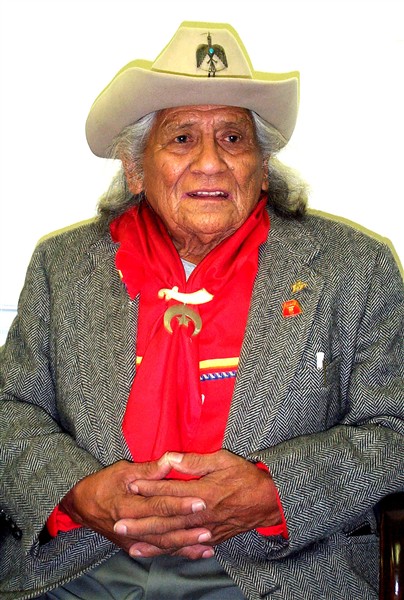
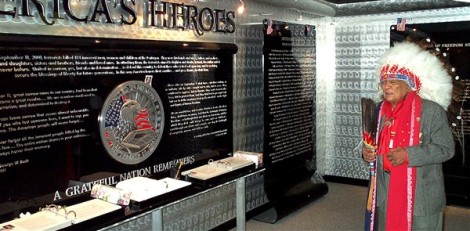
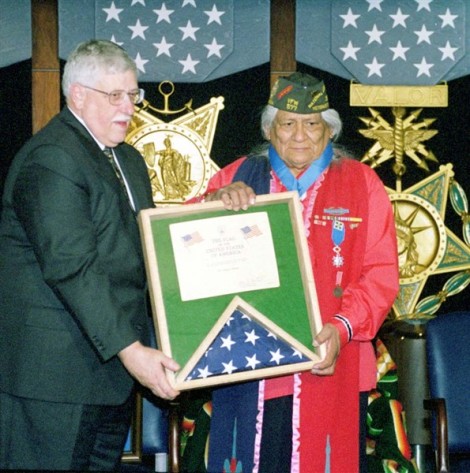
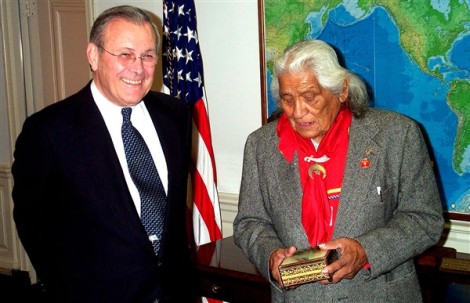
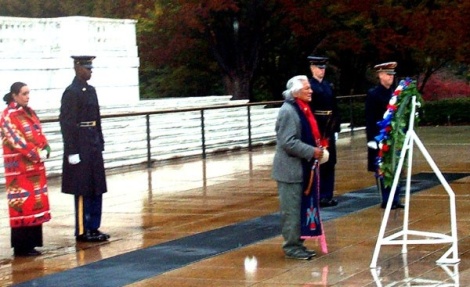
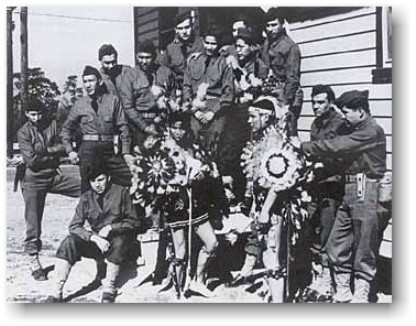

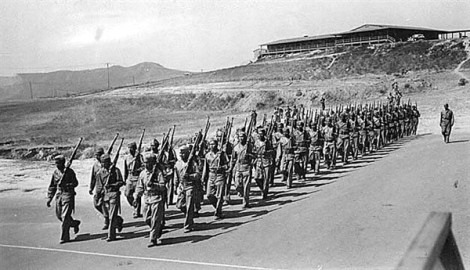


A friend, member of Post 355 ALA, Port St. Lucie, FL is in the process of organizing a benefit for military veterans based upon “Casey at the Bat” and is trying to invite Florida veterans of WWII to participate. She has asked me to find information about the Comanche calls that figured in communications in Europe during WWII since she is not computer literate (I am barely so). I’m not sure this web page is what she wants but I will pass this on to her. This activity is news to me, I was only 11 to 14 years old during WWII while she was married to a veteran of WWI, so the Comanche calls is news to me.
I appreciate the availability of this information and thank the people who have made this available. Hank
Hank: Thank you for your comment and for visiting my site. I have compiled all this information from various referenced sites throughout the internet and from personal information, trying to make a central place for folks like you. I knew Charles Chibitty and his brother, Woogie, as stated in my posts. They were fine men.
I am patriotic to the bone and am always looking for opportunities to honor our veterans and their families. Your friend’s project sounds like a great and honorable one. I wish her well on it. Please use any of the information available here if it will benefit the cause.
God bless our troops and veterans of all wars, along with those who have served in times of peace and their families who also sacrifice much.
Cheryl Davis
I’m related to him! Heck ya!
I WOULD LIKE TO KNOW DURING WHAT YEAR AND MONTH WAS CHARLES CHIBITTY AT FORT BENNING GEORGIA? WAS HE THERE IN NOVEMBER OF 1943? THANK YOU ,YOUR RESPONSE WOULD BE VERY HELPFUL. RICHARD BEACH
WAS CHARLES CHIBITTY AT FORT BENNING GEORGIA IN 1943?
I really enjoyed reading about Charles Chibitty and the Comanche code talkers a fine bunch of men they were great.
Mike
Scarborough North Yorkshire
we’re all related
love this article on the history of our people!
He is my sons’ grandfather, through their father chebon chibitty. We lived with Charlie, Elaine and Pam-so I seriously doubt some of the things said and attributed to Elaine by Carrie, however it is nice to see he is not forgotten by others…..he was an awesome story teller and loved his frybread “like his coffee and women-black” as he always used to joke…we miss him terribly.We were blessed to be able to enjoy his stories(not just about the war) first hand! Behind every great man is a great woman-he had that in spades, Elaine and Pam were amazing women…….I miss them all very much and always will.
My uncle, let him live forever.